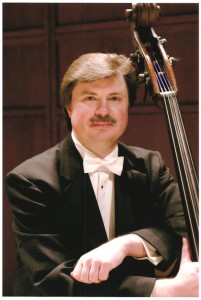
Photo credit: Michael Zirkle
Good morning, Chairman Miller, Ranking Member McKeon and members of the Committee. My name is Bruce Ridge. I am chairman of the International Conference of Symphony and Opera Musicians, or ICSOM, which is a conference of the American Federation of Musicians. I’m also a double-bassist in the North Carolina Symphony. On behalf of ICSOM’s thousands of members and AFM’s tens of thousands of members—comprising over 230 affiliated locals across the country, including Local 367 in Vallejo and Local 424 in Richmond, in your district, Mr. Chairman—I thank you for your attention to this issue.
In 1932, my orchestra was founded by the WPA. That was also a time of economic crisis, but instead of cutting back, we invested in the arts.
Critics sometimes say that classical music is just for the elite. But as an orchestral musician, I know how much everyone loves to hear us play. The numbers bear this out: Opera attendance has increased 40% since 1990. Classical music accounts for 12% of sales on iTunes, and music schools across the country are seeing an all-time high in numbers of applicants.
Musicians don’t do it for the money. We’re ultimately the nation’s biggest donors to the arts, and we’re the ones who sacrifice to keep orchestras alive in hard times. We happily give to the arts, but we must still pay doctors’ bills, make rent, and feed our families.
I’ve been fortunate in my career. I started playing at age 10, and I’ve worked steadily as an orchestral musician for 30 years. By age 15, I was a working professional in the Virginia Symphony. I would go from school to symphony, then play in late-night jazz clubs I was too young to legally get into otherwise. Back home by 3:00am, I’d be sitting in school just a few hours later. Although I may have started a bit younger than others, my story is not atypical. Many classical musicians work several jobs, driving from town to town as members of a “Freeway Philharmonic.” Some members work in as many as four different orchestras – each a different two-hour commute from home, and each with its own set of concerts, rehearsals, and community involvement.
In today’s economic climate, the challenges for working musicians are growing ever more serious. Many orchestras face the prospect of reduced seasons, layoffs, lower wages, and higher health care premiums. This is a national problem. The musicians of the Cincinnati Symphony, one of the world’s finest orchestras, recently accepted an 11% pay cut. The Baltimore Opera Company has filed for bankruptcy. The Santa Clarita Symphony, in your district Congressman McKeon, canceled its 2009 season. The musicians of the Honolulu Symphony are now seven weeks behind in paychecks. On a daily basis my phone rings with more news of yet another orchestra’s financial crisis.
For musicians, the losses are immeasurable. Some must sell their instruments to make ends meet, while others face the loss of their careers altogether. Many of these musicians have children or spouses who depend on them and who also suffer from these cutbacks. How could I respond, when a woodwind musician asked me how she could afford to take her child to the doctor after her orchestra’s proposed cutbacks?
Our losses are everyone’s losses. If musicians can’t afford to stay in the profession, the nation will lose its music.
Musicians are small-business people, patching together royalties, concert fees, and union benefits like session fees, pension, and health care to come up with a decent living. On Broadway, musicians face replacement by recorded music substituted for live music. In Hollywood, outsourcing film scores to musicians abroad threatens the livelihood of American musicians.
Congress can make—and indeed already has made—a big difference in these musicians’ lives. The American Jobs Creation Act helped our recording musicians by providing tax incentives for domestic film production. Pension reform legislation has also helped the AFM keep its pension plan available to musicians. Chairman Miller, we thank you for your leadership on this important issue.
Several members of this Committee have co-sponsored H.R. 848, the Performance Rights Act, which gives recording artists a right to royalties when their performances are played over AM/FM radio. Recorded music makes money for radio, but radio doesn’t pay performers a single cent. The Performance Rights Act would correct this inequity, and we ask you to consider supporting this important legislation.
Entertainment is America’s second-largest export, and music is essential to nearly all of its forms, either standing alone or as part of theater, film, and television. We can count the dollars, but we can’t count the value of music to the American spirit. We saw it when the New York Philharmonic traveled to North Korea on a mission of diplomacy and artistry. The nation and the world were electrified by those images. And we see it here at home when my WPA-founded North Carolina Symphony plays free concerts for tens of thousands of schoolchildren each year. I can’t even go to the grocery store without people telling me how much it meant to them when the North Carolina Symphony played at their school. The value of these experiences cannot be measured, and must not be lost.
On behalf of musicians everywhere, I thank you for this opportunity to address the Committee.





